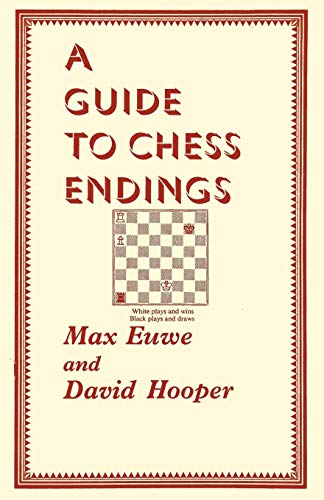Verwandte Artikel zu A Guide to Chess Endings

Zu dieser ISBN ist aktuell kein Angebot verfügbar.
Alle Exemplare der Ausgabe mit dieser ISBN anzeigen:Book by Euwe Dr Max Hooper David
Die Inhaltsangabe kann sich auf eine andere Ausgabe dieses Titels beziehen.
Reseña del editor:
Today many more tournament games are being played and club and match games brought more frequently to a finish so that the ending is not left to the adjudicator but is becoming of increasing importance to the ordinary player. For the expert it has long been an outstanding characteristic of his play and it is not an accidental that the greatest masters of chess ave also been the greatest masters of the end game. In the end-game, unlike the opening, proficiency does not depend on the memory but on methodical study and it is not difficult to acquire a skill that will add to points and half-points to the score table. Endgames are predominantly positional in character although combinative and tactical maneuvering often enlivens the play. The best endings have their own appeal, one of accurate timing and precision. But the compelling reason for study is surely the practical one: after a long struggle how heart breaking it is not to reap one's full reward because of poor end-play. In more than sixty examples from play in this book decisive mistakes were made, often by the greatest masters. In many ways the ending is a different kind of game: the importance of the pawn center diminishes; the king becomes more active; there is the possibility of stalemate; and the pawns, no longer a skeleton clothed by pieces, become powerful in them selves. When the number of pawns is reduced then values chance, so that a piece may be worth no more than a pawn. Rather than a sketchy outline of the whole field, this book makes a fairly thorough study of those endings most likely to occur in play, especially those with rooks. This book is best worked through as a course of study, so that the underlying ideas are absorbed and a sound positional judgment is acquired it is at first not necessary to understand every nuance, far less to try to remember the more difficult variations; indeed one might pass over the sub-variations at first reading. Some of the example, noticeable in the later chapters, are harder than others. Although considered a suitable textbook for the less skilled player, the more complicated studies, and some recent theoretical discoveries such as the analysis of R +BP +RP v. R and Q + KtP v. Q are included. Endings at first difficult yield to further stud; the weaker player should never be discouraged, for in time the ideas become clearer and a logical pattern is revealed. Examples are for the most part classified according to the kind of pawn formation and a dozen or more series of comparative studies are intended to show the importance of this. Most of the usual conventions are followed.
Biografía del autor:
Dr. Max Euwe was world chess champion from 1935 to 1937. He played all of the great players from Lasker to Fischer in tournaments and studied all of their games in great detail. He knew more about them and their games than anybody else. Max Euwe was born on May 20, 1901 in Amsterdam, Netherlands. Euwe was certainly the most active and prolific writer about the game. He was never a professional player. He had a real job. He was a math professor. After retirement he became a chess official. He was president of FIDE, the World Chess Federation, from 1970 to 1978. This was during the Cold War and Euwe had to make difficult decisions for the good of chess. It was absolutely, definitely because of Euwe that Bobby Fischer got to sit down at the board to play a match for the World Chess Championship. Fischer had been disqualified many times along the way, the first time being when he refused to play in the US Championship that was a necessary preliminary to the World Chess Championship competition. Max Euwe, himself a past world champion, acted as both referee and official at the famous Iceland matches in 1972. Max Euwe died on November 26, 1981 in his native Amsterdam at age 80. David Vincent Hooper was born in Reigate, England on August 31, 1915. He first attracted international attention by winning, with a round to spare, the tournament at Blackpool 1944. Although an amateur, he tied for fifth place in the 1949 British Championship at Felixstowe. He was the British correspondence chess champion in 1944 and the London Chess Champion in 1948. He played on the British team in the Chess Olympiad at Helsinki in 1952. He died on May 3, 1998 in the United Kingdom. Hooper was an expert in the chess endgame and in chess history of the nineteenth century. He is best known for his chess writing, including The Oxford Companion to Chess (1992 with Ken Whyld), Steinitz (Hamburg 1968, in German), and A Pocket Guide to Chess Endgames (London 1970).
„Über diesen Titel“ kann sich auf eine andere Ausgabe dieses Titels beziehen.
- VerlagIshi Press
- Erscheinungsdatum2011
- ISBN 10 4871874753
- ISBN 13 9784871874755
- EinbandTapa blanda
- Anzahl der Seiten258
- Bewertung
Neu kaufen
Mehr zu diesem Angebot erfahren
EUR 32,17
Versand:
EUR 11,70
Von Vereinigtes Königreich nach USA
Beste Suchergebnisse bei AbeBooks
A Guide to Chess Endings
Anbieter:
Bewertung
Buchbeschreibung Paperback. Zustand: Brand New. 258 pages. 8.43x5.43x0.87 inches. In Stock. Bestandsnummer des Verkäufers zk4871874753
Weitere Informationen zu diesem Verkäufer | Verkäufer kontaktieren
Neu kaufen
EUR 32,17
Währung umrechnen

